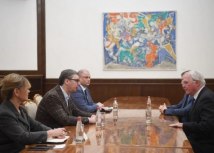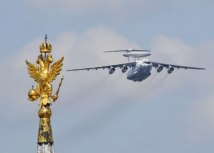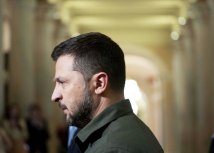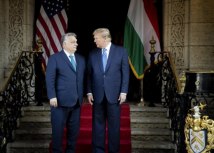What Syria tells us about U.S.
Revealed on 24/7 news: a nation sick and tired of foreign wars, and urging Obama to stick to his original promise
Timothy Garton AshIn all the long history of American presidential addresses, has there been an odder one than this? With the solemn grandeur appropriate to a declaration of war, president Barack Obama informed the American people on Tuesday night that a Congressional vote on military action had been postponed because Russia was now brokering a diplomatic initiative that might – or might not - put Syria’s chemical weapons under international control. A Gettysburg address this wasn’t.
There will be many more turns on the road to Damascus, but the politics of these weeks since the criminal use of chemical weapons in Syria on 21 August already tell us a lot about the United States. First and foremost, they tell us what Obama himself acknowledged in his televised address, quoting the words of a letter sent him by a veteran: ‘this nation is sick and tired of war’.
Yes, the shadow of being misled by Colin Powell (of all people) about the intelligence on Saddam Hussein’s weapons of mass destruction hangs over this debate, as over European ones. But that’s not the main point for most Americans. According to a New York Times/CBS poll earlier this week, 75% of Americans think the Syrian government ‘probably did’ use chemical weapons against Syrian civilians - and still they’re overwhelmingly against the US military response that Obama advocated. Every one of the countless members of Congress that I’ve seen interviewed on 24/7 cable news has acknowledged this, be they Republican or Democrat, for or against striking Syria. Only ‘three or four’ out of at least a thousand constituents he’s talked to favour military action, reports congressman Elijah Cummings, a Democrat and Obama supporter. Senator Rand (son of Ron) Paul, a rising star of the Republican party, says his phone calls are ‘100 to 1’ against war.
The American people are just ‘sick and tired’ of it. They don’t think it’s done any good in the Middle East. It’s cost trillions of dollars, while they’ve been losing their jobs and homes, struggling to get by, seeing their own roads, hospitals and schools decay. Now here’s the great irony: this is Obama’s own theme tune. He’s the president who came into office to end ‘a decade of war’ (a trademark phrase he used again in this speech) and concentrate on ‘nation-building at home’. So the popular sentiment is one he both reflected and reinforced.
And - irony upon irony - if Obama’s own best enemy, Russian president Vladimir Putin, had not self-interestedly ridden to the rescue at the eleventh hour, that very sentiment would probably have delivered a shattering blow to the Obama presidency. For when we woke up on Monday morning, it looked as if he faced defeat in a vote in the House of Representatives, if not in the Senate.
‘Isolationism’ is the lazy term often applied to the attitude now found among Democrats and Republicans alike. It is true that the United States has a history of periodically withdrawing into its own vast continental indifference, as it did after World War I. But this time feels different. While the current withdrawalism undoubtedly drinks from some of those traditional wells, it flows through a country not brashly rising on the world stage but fearfully conscious of relative decline. Back in the 1920s, Americans were not worried about a rising China eating their lunch - and then buying the hamburger stall. They are now.
A few more specific ingredients of this American pie also deserve mention. One is Israel. It is hard to overstate the impact of concerns about Israel on American foreign policy in general, and its Middle East policy in particular. Some of the most chilling analysis I have read over these weeks identifies an Israeli realpolitik which concludes that the least worst outcome for Israel is that two sets of its arch-enemies, the Iran and Hezbollah-backed Assad regime and the increasingly Sunni Islamist extremist and partly Al-Qaeda oriented rebels, should go on beating the living daylights out of each other. ‘Our “best case scenario” is that they continue to busy themselves fighting each other and don’t turn their attention to us,’ an unnamed Israeli intelligence officer tells a writer on buzzfeed.com. ‘Let them both bleed, haemorrhage to death: that’s the strategic thinking here,’ says Alon Pinkas, a former Israeli consul general in New York. This makes Machiavelli look like Mahatma Gandhi.
Then there are the interventionist hawks, such as John McCain and Paul Wolfowitz, who believe the US should act more decisively so as to enable more moderate rebels to overthrow Assad. They’ll be very unhappy with a fix that may only contain the chemical weapons, and that only by making a Russian-brokered deal with Assad. Beside them are Republican politicos so incurably partisan that doing down Obama takes precedence over stopping Assad. And there are the seasoned strategic types – quite a lot of them, actually, not least in or connected to the US military – who carefully think through all the strategic implications for the US and the region. Overwhelmingly, their message is caution.
Last but not least, there are still a few liberal, humanitarian interventionists, of the old 1990s genre, shaped by the experiences of Bosnia, Rwanda and Kosovo.. Obama has appointed as his ambassador to the UN an almost totemic representative of that persuasion, Samantha Power, the author of a 2002 book called A Problem from Hell: America and the Age of Genocide. Well, Syria is a problem from hell alright. These liberal humanitarian interventionists are not the predominant voice in an administration characterised by cautious, security-first pragmatism, but they’re still there.
I am writing this column on the twelfth anniversary of the 11 September 2001 terrorist attacks which launched the United States into that decade of war – justifiably, in the immediate response to Al Qaeda in Afghanistan, unjustifiably and disastrously in Iraq. This is a very different America now. Maybe after some years spent putting its own house in order it will come back as the - for all its many faults and hypocrisies – indispensable anchor of some kind of liberal international order. But given not just its structural domestic problems but above all the changing global power constellation around it, I somehow doubt it. To the many critics and downright enemies of America, in Europe and across the globe, I say only this: if you didn’t like that old world in which the United States regularly intervened, just see how you like the new one in which it does not.
timothygartonash.com
Timothy Garton Ash is Professor of European Studies at Oxford University, where he directs www.freespeechdebate.com, and a Senior Fellow at the Hoover Institution, Stanford University. He is the author, most recently, of Facts are Subversive: Political Writing from a Decade Without a Name



